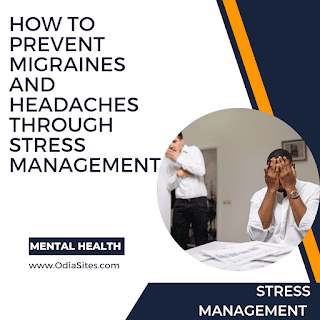How to Prevent Migraines and Headaches through Stress Management
 |
| Prevent Maigrain by Stress Management |
Finding Relief: Prevent Migraines and Headaches by Managing Stress
Living with migraines and headaches can be debilitating, affecting our daily lives and productivity. While there are various factors that contribute to these conditions, stress is a significant trigger. In this article, we will explore effective strategies and techniques to prevent migraines and headaches by managing stress.
headaches can be debilitating, affecting our daily lives and productivity. While there are various factors that contribute to these conditions, stress is a significant trigger. In this article, we will explore effective strategies and techniques to prevent migraines and headaches by managing stress.
Understanding Migraines and Headaches:
Before delving into stress management, it's essential to understand the nature of migraines and headaches. We'll examine the symptoms, types, and the impact they have on individuals.
The Link Between Stress and Migraines/Headaches:
Stress and tension often go hand in hand with migraines and headaches. We'll explore the underlying mechanisms that connect stress to these conditions and shed light on the intricate relationship.
Identifying Stress Triggers:
To effectively manage stress, we must first identify its triggers. We'll discuss common stressors and help you recognize the specific factors that contribute to your migraines and headaches.
Stress Management Techniques:
This section will present a variety of stress management techniques that can help prevent migraines and headaches. From relaxation and breathing exercises to incorporating regular exercise and physical activity, we'll provide practical tips to alleviate stress.
Healthy Lifestyle Habits:
A healthy lifestyle plays a crucial role in managing stress and reducing the frequency of migraines and headaches. We'll explore the importance of nutrition, sleep, and other lifestyle factors, along with actionable advice for incorporating healthy habits into your daily routine.
Time Management and Prioritization:
Effectively managing time and priorities can help reduce stress levels. We'll discuss techniques such as setting realistic goals, delegating tasks, and practicing effective time management strategies.
Seeking Support and Counseling:
Sometimes, managing stress requires reaching out for support. We'll highlight the significance of seeking assistance from loved ones, joining support groups, or considering counseling to navigate stressful situations.
Creating a Calming Environment:
Our surroundings can significantly impact our stress levels. We'll provide insights into creating a soothing environment at home, work, or any other spaces that can contribute to stress reduction.
Mindfulness and Meditation:
The practice of mindfulness and meditation has proven benefits in stress management. We'll guide you through simple techniques to incorporate mindfulness into your daily life and explore the positive impact it can have on migraines and headaches.
Nutrition and Diet Tips:
Proper nutrition can play a role in managing stress and preventing migraines and headaches. We'll discuss foods that can help alleviate stress and those that may trigger episodes. Additionally, we'll offer dietary tips to support your overall well-being.
Taking Breaks and Restoring Balance:
Engaging in regular breaks and activities that promote relaxation is vital for stress management. We'll explore effective ways to take breaks, restore balance, and recharge, ensuring you maintain a healthy equilibrium.
Managing Work-related Stress:
Work-related stress can be a significant trigger for migraines and headaches. We'll provide strategies to manage stress in the workplace, including setting boundaries, practicing effective communication, and engaging in stress-relieving activities during work hours.
Avoiding Overuse of Medications:
While medications can provide temporary relief, excessive use may lead to rebound headaches. We'll discuss the importance of using medications judiciously and explore alternative approaches to managing migraines and headaches.
Tracking and Managing Migraine/Headache Patterns:
Tracking your migraine and headache patterns can offer valuable insights. We'll discuss tools and techniques to help you monitor and manage your symptoms effectively, enabling you to identify trends and triggers.
Seeking Professional Help:
When stress becomes overwhelming or if migraines and headaches persist despite efforts to manage stress, seeking professional help is crucial. We'll explore the available resources and treatment options, including therapy, medication, and specialized interventions.
Conclusion:
By proactively managing stress, we can significantly reduce the occurrence and intensity of migraines and headaches. Utilize the strategies discussed in this article, and remember that finding the right combination of stress management techniques may require some experimentation. With time and perseverance, you can regain control and find relief from migraines and headaches, leading to a healthier, happier life.




0 Comments